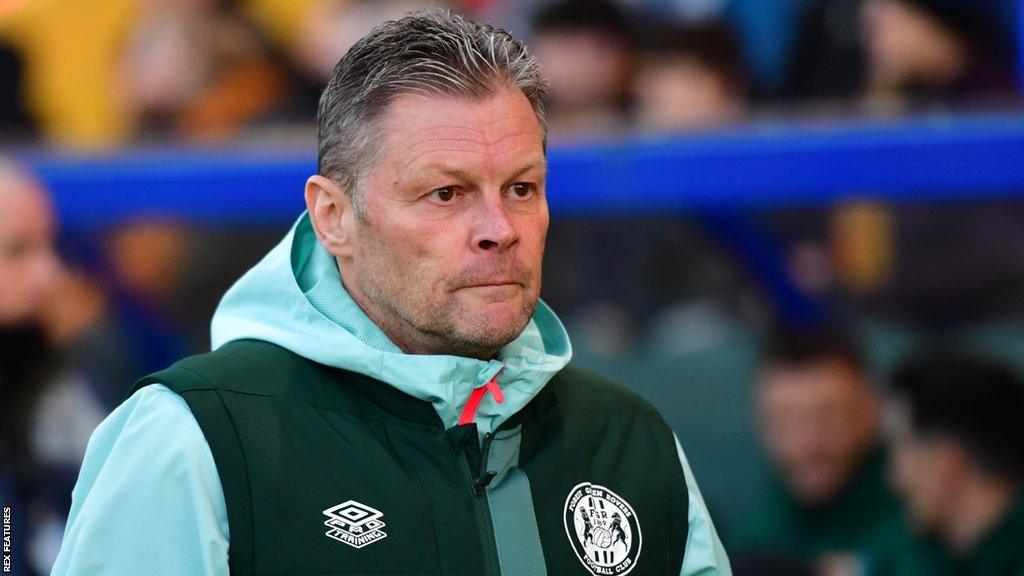Forest Green Rovers relegated from League Two after seven seasons in EFL
- Published

Steve Cotterill was appointed Forest Green manager in January with the aim of keeping the club in the EFL but they have only won five times in their last 17 games
Forest Green Rovers have been relegated to the National League after seven seasons in the EFL.
Colchester United's 2-0 win against Grimsby Town means they are eight points above Rovers in 22nd in League Two, with two games to play.
Rovers have been in the bottom two for most of the season and have won only nine of their 44 matches.
A return to the fifth tier caps a difficult two seasons since the club won a first promotion to League One.
However, since then Forest Green have endured instability behind the scenes, with relegation last season and five managers appointed - three since last summer - as well as the director of football and chief executive both changing.
Duncan Ferguson was sacked after only five months in charge during pre-season last July, with David Horseman eventually replacing him less than three weeks before this campaign started.
However, Horseman oversaw only four wins - not helped by an injury crisis through the autumn - and left the club in December before the busy festive period.
Player-coach Troy Deeney was the surprise next choice to take the top job although the former Birmingham and Watford captain's tenure was even shorter, ending acrimoniously just six games later with the club seven points from safety.
Owner Dale Vince admitted the club's approach of choosing coaches with potential at the start of their career had not paid off and experienced boss Steve Cotterill was brought in on 25 January with the sole aim of keeping the club in the league.
Results did improve, with five wins and two draws in Forest Green's last 17 games, but it came too late to preserve the club's status in the EFL.
Three consecutive losses - including a 6-0 hammering by Wrexham on Saturday - all but confirmed the club's fate, meaning they will return to the fifth tier.
'Keeping Cotterill crucial to bouncing back'
Analysis - Paul Furley, BBC Radio Gloucestershire
Two seasons ago, Forest Green were stumbling towards the League Two title. Now they tumble out of the Football League after successive relegations.
Chairman Dale Vince is one of the few characters to have been involved throughout that time of turbulence and change, with some fans blaming or accusing him of taking his eye off the ball.
That's harsh, after a series of appointments made with the best of intentions, as he looked to appoint a head coach into their first League One role and replicate the success of Rob Edwards.
Vince has tried to be loyal and backed his appointments financially, but that has also meant those coaching changes have always come during a transfer window, with Edwards in January 2022 the last to have a full window to work with, let alone time to plan.
Former director of football Rich Hughes - who appointed John Mousinho at Portsmouth - has been equally difficult to replace.
Finally the club opted for the experience of Cotterill, who was appointed with 19 games to go in January.
Within 14 matches he had won more games than his two predecessors had managed in 27 between them, but a run of fixtures against the top five has meant Rovers struggled when they needed to kick on.
Steve Cotterill looked broken after the 6-0 defeat at Wrexham, the result adding insult to the wound of his team's inevitable fate.
Keeping him will be crucial to the club's chances of restoring confidence to whatever remains after the summer of a damaged playing squad and their hopes of bouncing back.